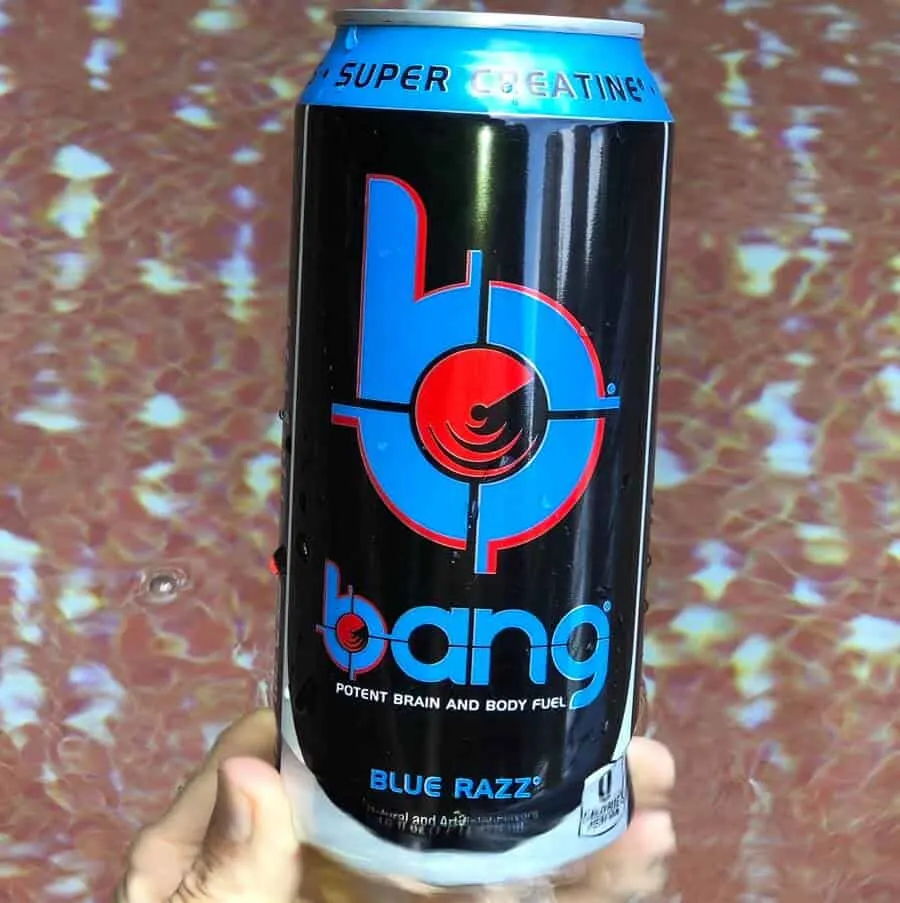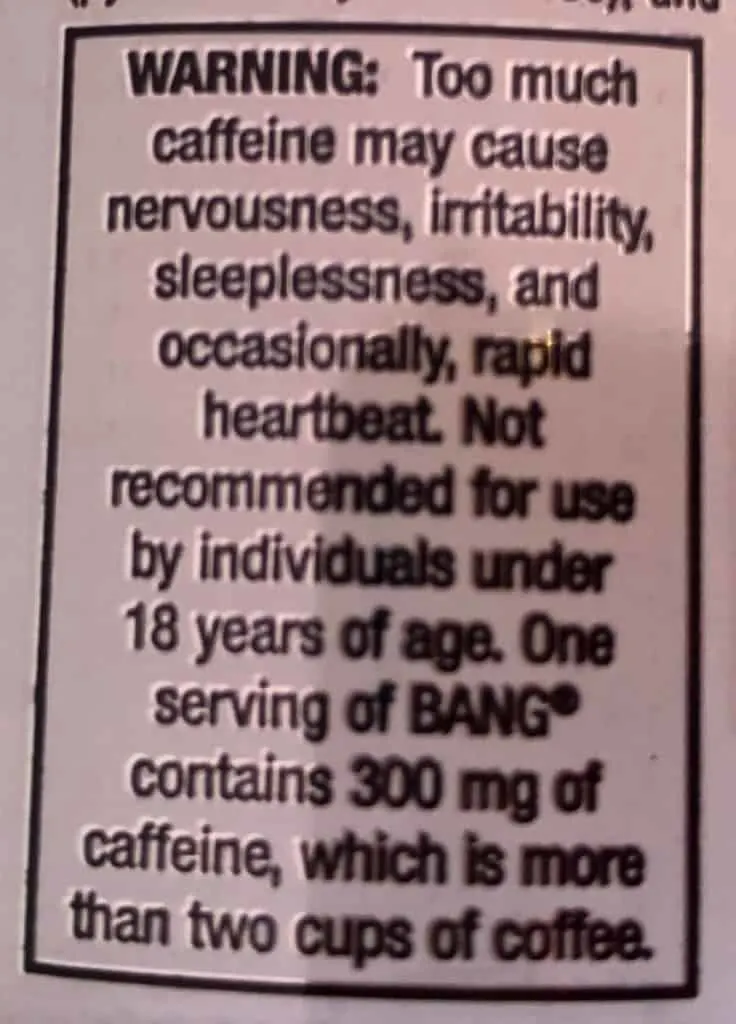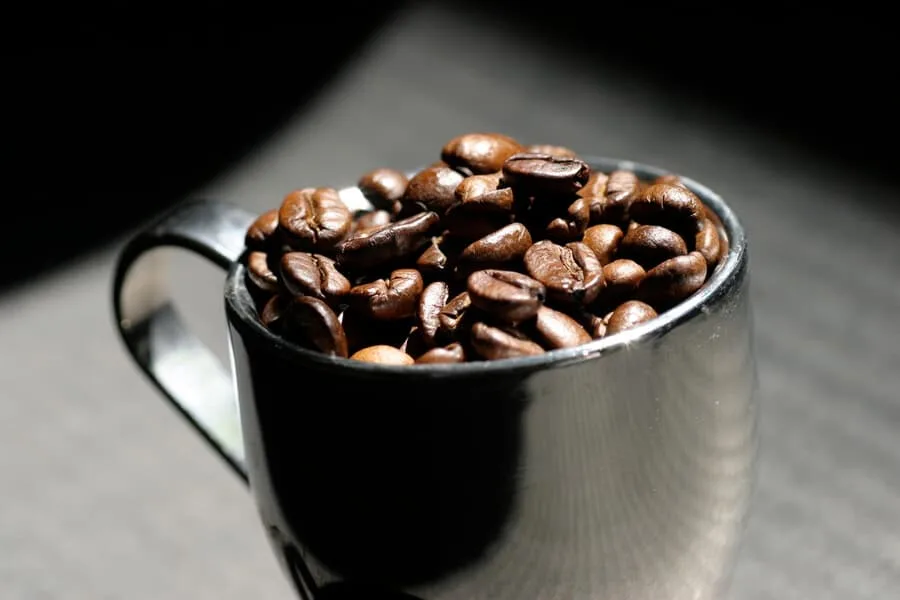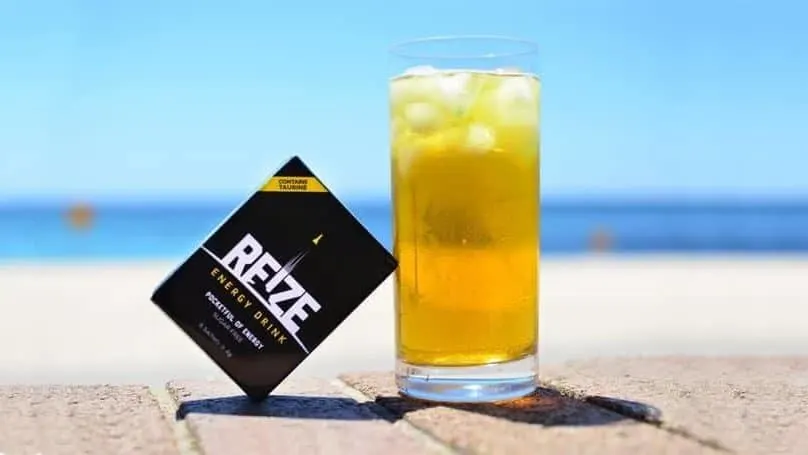Bang is a well-known energy drink brand that’s promoted as an energy drink for athletes to have better workouts and mental function. Its ‘Potent Brain and Body Fuel’ slogan really speaks for itself.
Bang is famous for containing the largest amounts of caffeine in an energy drink, which could cause alarming side effects.
Bang claims to have 300 mg of caffeine in each serving, which is close to the FDA’s recommended 400 mg daily limit. This is high enough to be overwhelming for those with low caffeine tolerance.
However, independent lab testing has revealed that Bang actually contains less caffeine than the brand claims.
How could this be and what source of information should we believe?
Stay with me as I unravel the truth behind Bang’s caffeine content and the possible side effects of consuming large amounts of caffeine.
What does a can of Bang Energy drink contain?
Every can of Bang Energy Drink contains the following ingredients:
- 300mg caffeine (more on that below)
- 0 calories
- 0g total fat
- 0mg cholesterol
- 40mg sodium
- 85mg potassium
- 0g total carbohydrates
- 0g total sugars
- 0g protein
- Vitamin C
- Vitamin B6
- Magnesium
- Niacin
- Vitamin B12
It also contains traces of:
- Carbonated water
- Citric acid Anhydrous
- Caffeine Anhydrous
- Sodium benzoate
- Potassium sorbate
- Potassium citrate monohydrate
- Sucralose
- Natural flavors
- L-Leucine
- Potassium phosphate dibasic
- Vitamin C
- Acesulfame potassium
- Magnesium chloride
- SUPER CREATINE (Creatyl-L-Leucine)
- L-Isoleucine
- L-valine
- Calcium chloride
- Calcium disodium EDTA
Independent lab testing showed that some amino acids listed above were actually not detected and the caffeine quantity was significantly different from the 300mg per can figure.
How much caffeine is in Bang Energy Drink?

Every 16 fl. oz can of Bang Energy supposedly contains 300mg of caffeine, as stated on its nutritional label. This hefty amount seems to have won it a place among the strongest energy drinks available in the market.
However, I’ve paid to lab test Bang twice before and honestly, the results about its caffeine content were quite surprising.
From the tests performed by Alpha Testing Labs, I discovered that a can of Bang Energy Drink (Purple Guava Pear flavor) actually contains 34.06mg of caffeine, which is around 88.6% less than what’s advertised as being in a can by Bang.
I couldn’t believe it at first, so I sent another sample of Bang (Sour Heads flavor) to ChemLab, another laboratory for testing. The results came back and it showed that a 473ml (16 fl. oz) can of Bang Energy drink contains 188mg of caffeine.

I was told through an email conversation with the lab that a lack of quality control might have been the reason for the inconsistencies between the lab test results.
Then again, the right way to have Bang tested properly would be to send the same flavor to different labs for testing simultaneously. That way I might have gotten more or less similar results.
Still, it was interesting to find out that each flavor of Bang seems to contain different levels of caffeine.
Is drinking caffeine healthy?

Caffeine provides your body with many benefits if you control your daily consumption. There’s also a good reason a lot of pain-relieving medications, like Midol and Anacin, contain a small amount of caffeine – caffeine increases their efficacy by 40%.
One of the most obvious benefits that caffeine can give you is a boost in your energy levels.
Caffeine is often used to reduce the symptoms of fatigue and enhance alertness and focus. In this study performed on seven participants in a high-intensity cycling exercise, it was found that consuming caffeine increased the time to exhaustion by 12%.
Caffeine also helps in improving cognitive functions. It functions by blocking sleep-regulating molecules called adenosine in your brain so you’ll stay awake and feel less tired. This change in your brain causes mood-regulating neurotransmitters called dopamine and serotonin to be released.
The overall effect of this is an improvement in mood and cognitive performance.
Animal studies showed that moderate doses of caffeine in mice improved motor and memory functions, while higher dosages of caffeine lead to less anxiety in mice.
Another study of 23 participants found that caffeine, even in low doses, could significantly boost cognitive performance and mood.
Thus, if you’re feeling down in the dumps or unable to think properly, grab a can of energy drink to make yourself feel better.
Furthermore, caffeine can boost physical performance. It can stimulate your nervous system, releasing adrenaline throughout your body. Your body then goes into a state of fight-or-flight, making you ready for physical exertion.
Many athletes have energy drinks or anything caffeinated to increase their energy levels and enhance their performance.
Studies have proven that caffeine helps in improving physical performance by 11.2%. A 2004 research paper found that caffeine could enhance endurance when performing exercises and significantly increase the time it takes to get exhausted.
Caffeine is also beneficial to older adults. Older adults are susceptible to dementia, Alzheimer’s, and cognitive decline. One study discovered that coffee drinkers in their midlife were less likely to develop cognitive decline, Alzheimer’s, and dementia by a whopping 65%.
As you can see, caffeine can be great for your health if you consume it in moderation. But if you go overboard, you’ll end up with some nasty side effects.
Side Effects of Caffeine
One of the most common ones is experiencing a caffeine crash. When you have a crash, you’ll start to feel sleepy and lethargic as the effects of the caffeine begin to diminish. You may also become irritable and start to lose concentration.
Other side effects of consuming too much caffeine are listed below:
- Anxiety
- Restlessness
- Insomnia
- Flushing
- Increased need to urinate
- Shaking or twitching
- Irritability
- Agitation
- Irregular or fast heartbeat
- Feeling confused
- Hallucinations
- Seizures
- Death (this is pretty rare, but can happen)
If you want to know how much caffeine you should be having in a day, the FDA recommends that adults should consume less than 400mg of caffeine per day, with no more than 200mg in one serving.
My personal caffeine preference is between 50 to 100mg per serving. If I have any more than this in a single caffeinated beverage, I often end up feeling flushed and unable to concentrate.
You must remember that caffeine can only provide benefits to you if you control your daily consumption.
Moderation is key.
Is the caffeine content in Bang safe?
I wouldn’t agree that the caffeine content in Bang is completely safe as it’s close to the maximum daily limit of 400mg daily.
If you have a low tolerance for caffeine, you might not be able to handle even a single full can of Bang Energy Drink.
I have written a review of Bang and its ingredients in another article. If you’re interested in learning more, check those out.
If you want to try drinking Bang, I can advise you to limit your intake to only one can a week. Even if you have a high tolerance for caffeine, your body might still succumb to the side effects later on.
If you really want to up the ante, don’t drink any more than a single can of Bang per day. That’s a pretty sensible upper limit in my opinion.
You also need to keep an eye out for caffeine dependence and caffeine withdrawal symptoms if you’re playing amongst the strongest energy drinks, which Bang is one of.
If you’re curious about how Bang stacks up against Reign, I’ve covered everything you need to know in this article.
What is caffeine withdrawal and how can I cope with it?
When you’ve been consuming a lot of caffeine for a long time, you become more tolerant of its effects and somewhat dependent, or even addicted, to it. When you attempt to reduce your caffeine intake or quit caffeine for some time, you might experience symptoms of caffeine withdrawal.
Some of the symptoms you may experience due to caffeine withdrawal include:
- Headaches
- Fatigue
- Constipation
- Difficulty concentrating
- Changes in mood
If you want to avoid or reduce these symptoms, some of the steps you can take include reducing your intake slowly and replacing your daily caffeinated beverages with suitable replacements, like decaffeinated coffee.
Besides that, you should get enough sleep to keep yourself adequately energized and reduce your reliance on caffeinated drinks. Drinking more water is also vital as dehydration leads to headaches and tiredness.
If you need help quitting caffeine, this article is a must-read.
Is Bang the strongest energy drink?
Bang isn’t the strongest energy drink on the market. So far, Spike Hardcore and Redline Xtreme Energy are the strongest energy drinks, both with considerably more caffeine than Bang.
Spike Hardcore contains 350mg of caffeine while the Redline Xtreme has 316mg of caffeine.
Bang has 300mg per can, which is still a staggering amount, but not enough to edge out the top spot for the strongest energy drink in the world.
However, as mentioned above, whether Bang actually contains 300mg of caffeine per can or not depends on whether you believe Bang or independent lab test results.
Bang says there is 300mg in a can, but the lab test results show a much lower figure.
You can decide which source of information you think is accurate.
How many Bang Energy drinks can you drink in a day?
If you are a healthy person that’s active, one can of Bang Energy a day is relatively safe to consume.
The caffeine content in Bang Energy is something that you should watch out for because of its potency. To put it in perspective, 300mg of caffeine is equivalent to consuming three cups of black coffee straight. I love coffee but that’ll certainly spoil it for me.
In that sense, when you decided to make consuming a can of Bang a daily habit, I suggest spacing out your consumption to avoid shocking your body.
And if you feel any unpleasant effects, it’s best to take a break from consuming Bang Energy or any other energy drink.
I have expanded my explanation in this article. Check it out!
How much caffeine is in Bang vs coffee?
Bang Energy officially contains 300mg of caffeine per standard can while an 8 oz cup of black coffee stands at 80 to 100mg of caffeine.
As you can see, Bang does contain more caffeine compared to coffee if our point of reference is the label on the can. On the other hand, the argument becomes stronger if we refer to the results of lab test results for caffeine content in Bang Energy drinks.
Personally, no matter how significantly lower the amount of caffeine in Bang is, I’d still choose a cup of coffee because it’s healthier and I can control the ingredients and amount of add-ons in each serving.
Bang vs Red Bull Caffeine
| Red Bull energy drink (8.4 fl. oz) | Red Bull energy drink (8.4 fl.oz) |
| 300mg | 80mg |
As you can see, a can of Bang has almost four times the amount of caffeine compared to one can of Red Bull. Even if you were to consume half of a can of Bang, you’d still be consuming around 150mg of caffeine, which is still a lot more than the caffeine in an entire can of Red Bull.
Red Bull is pretty effective with just 80mg of caffeine, but maybe if you want something stronger, you can go for Bang.
Though, I don’t think Bang is an energy drink you can drink too often, as you’re hitting close to the daily recommended maximum caffeine limit in every can.
Bang vs Monster Caffeine
| Monster Energy Drink (16 fl. oz) | Monster Energy Drink (16 fl.oz) |
| 300mg | 179mg |
Monster has a reputation for having high amounts of caffeine, but it still doesn’t compare to Bang. A 16 fl. oz can of Bang is the same as nearly two cans of Monster in terms of total caffeine quantity.
If you’re interested in how Monster and Red Bull are similar, and what their biggest differences are, check out this great article where I cover literally everything you could ask about the two leading brands.
Bang vs REIZE Caffeine

| Bang (16 fl.oz) | REIZE Energy Drink (4g sachet) |
| 300mg | Bang (16 fl. oz) |
REIZE definitely has significantly less caffeine than Bang, but it allows for a more efficient increase in energy levels without overdoing it. Plus, even with 50mg of caffeine, you’ll still enjoy the benefits while controlling your daily caffeine intake.
I’m sure you’ll agree, REIZE is a more sensible choice in terms of caffeine content.
REIZE is also sugar-free and contains a smart mix of taurine, ginseng, and B vitamins. This great blend of ingredients works together with the caffeine to give you the perfect energy boost, without the crash.
It’s super versatile too, as you can add it to almost any beverage you like, be it coffee, juice, or water.
Perhaps best of all, REIZE ships to your door for only about $1 per drink, which is a lot more affordable than most energy drinks – including Bang.
Try REIZE today and I’m sure you’ll agree that it’s a better choice than Bang – and safer too.

